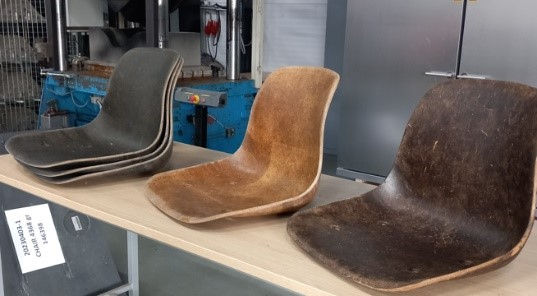CISL: Ground-Breaking Sustainable Retrofit Based on Circular Economy Principles
- Jul 27, 2022
- 3 min read
Eve Waldron Design is making progress on its work with the Cambridge Institute for Sustainability Leadership's The Entopia Building, which was launched by HRH Prince Charles last month.
We are now well advanced in the retrofit of interiors of the Cambridge Institute for Sustainability Leadership’s Entopia Building.
Entopia was officially launched on the 31st March by CISL’s royal founding patron, HRH The Prince of Wales, and occupation is expected to begin in the coming months. This ground-breaking project is based around the principle of the circular economy and will be an exemplar for future sustainable office retrofits around the world.
A circular economy is a model of production and consumption that reflects the values of the Cambridge Institute for Sustainability Leadership. Unlike the more traditional linear economy where natural resources are ultimately destined to become waste, a circular economy involves sharing, leasing and reusing existing materials and products for as long as possible.
Entopia’s name is a blend derived from the ‘En’ of Envision, an electric car battery manufacturer which donated £6m towards the cost of the building, and utopia. The current green retrofit project is transforming a 1930s former telephone exchange to create a new home for CISL, including its international offices and expanding global network. The Entopia Building will also host The Canopy; an Accelerator and Sustainability Hub which will support innovative start-ups and small businesses. The ground-breaking £12.8m project aims to achieve multiple sustainable building certifications, including BREEAM (Outstanding), the Passivhaus ‘EnerPHit’ standard and WELL (Gold) certification.
Eve Waldron Design has had significant involvement in space planning and specifying the office furniture at the Entopia Building in line with circular economy principles. Furniture has been sourced second-hand either from, the Cambridge University Warp-It system, or from reusing CISL’s existing collection. Hemp fabric by Camira and recycled plastic fabric by InLoom have been used for reupholstery, while the building’s chairs and barstools are constructed from the 100% plant-based materials of hemp and resin.
In addition, Eve Waldron Design has fitted Entopia’s kitchens with wood from a renewable giant bamboo species renowned for its CO2-absorbing and oxygen-producing capacity. Bamboo’s sustainability is augmented by its durability - because of the wood’s high harness, density and stability, bamboo products last a long time.
The tiles for kitchen’s worktops are made from 98% recycled materials, approximately 60% of which would normally end up in landfill. Finally, Eve Waldron Design has used linoleum, which captures more climate-harming CO2 than it releases, for the flooring in the building’s communal areas.
For the launch event we printed a range of sustainable materials, promising the future of interior design, to showcase, including the biodegradable and renewable hemp, 100% recyclable Strawboard and RE-CD, which is a unique, sustainable composite material consisting of 100% waste compact disks. The latter, when recycled, prevents CDs from degrading in landfills for over a million years.
The building sector contributes over 40% of worldwide carbon emissions and therefore our ambitions for supporting a circular economy are necessary and heartfelt. It is difficult to compare both interior materials and furniture based on carbon footprint and other measures of sustainability, but we have strived to reuse as much as possible. Our choices of materials and products can always be challenged, and we hope that the finished Entopia building serves as a case study for what it possible as well as a lab for trialling materials.


